
This course provides students with a comprehensive introduction to the field of Information and Communication Technology (ICT). It explores the fundamental concepts, tools, and applications that form the foundation of modern digital systems. Students will learn how ICT is used to create, store, process, and share information in personal, academic, and professional contexts.
Key topics include computer hardware and software, operating systems, networks and the internet, digital communication, data management, cybersecurity, and emerging technologies. The course also emphasizes responsible digital citizenship, ethical use of technology, and the societal impacts of ICT.
Hands-on activities and projects will give students practical experience in using common productivity software, designing basic websites, managing data, and solving problems using technology.
Learning Outcomes:
-
Understand the basic components and functions of computer systems and networks.
-
Demonstrate proficiency in productivity tools such as word processors, spreadsheets, and presentation software.
-
Explain the role and impact of ICT in modern society, including ethical and security considerations.
-
Communicate effectively using digital tools and collaborate in online environments.
-
Apply problem-solving and critical thinking skills using ICT resources.
- Teacher: Admin User
